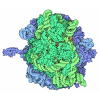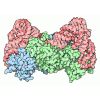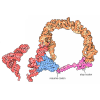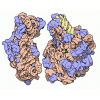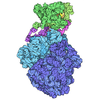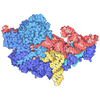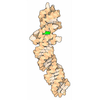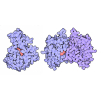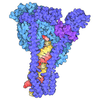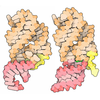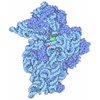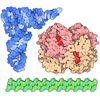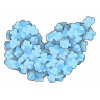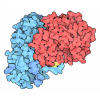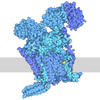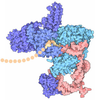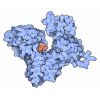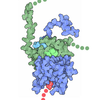[English] 日本語
 Yorodumi
Yorodumi- PDB-6wru: Structure of the 50S subunit of the ribosome from Methicillin Res... -
+ Open data
Open data
- Basic information
Basic information
| Entry | Database: PDB / ID: 6wru | ||||||
|---|---|---|---|---|---|---|---|
| Title | Structure of the 50S subunit of the ribosome from Methicillin Resistant Staphylococcus aureus in complex with an isomer of the tedizolid | ||||||
 Components Components |
| ||||||
 Keywords Keywords | RIBOSOME / antibiotic / tedizolid / oxazolidinone | ||||||
| Function / homology |  Function and homology information Function and homology informationlarge ribosomal subunit / transferase activity / 5S rRNA binding / ribosomal large subunit assembly / large ribosomal subunit rRNA binding / cytosolic large ribosomal subunit / cytoplasmic translation / tRNA binding / negative regulation of translation / rRNA binding ...large ribosomal subunit / transferase activity / 5S rRNA binding / ribosomal large subunit assembly / large ribosomal subunit rRNA binding / cytosolic large ribosomal subunit / cytoplasmic translation / tRNA binding / negative regulation of translation / rRNA binding / structural constituent of ribosome / ribosome / translation / ribonucleoprotein complex / mRNA binding / RNA binding / cytoplasm Similarity search - Function | ||||||
| Biological species |  | ||||||
| Method | ELECTRON MICROSCOPY / single particle reconstruction / cryo EM / Resolution: 3.1 Å | ||||||
 Authors Authors | Belousoff, M.J. | ||||||
| Funding support |  United States, 1items United States, 1items
| ||||||
 Citation Citation |  Journal: ACS Pharmacol Transl Sci / Year: 2020 Journal: ACS Pharmacol Transl Sci / Year: 2020Title: Characterization of the Core Ribosomal Binding Region for the Oxazolidone Family of Antibiotics Using Cryo-EM. Authors: Alexander Wright / Kieran Deane-Alder / Edward Marschall / Rebecca Bamert / Hari Venugopal / Trevor Lithgow / David W Lupton / Matthew J Belousoff /  Abstract: Linezolid and tedizolid are oxazolidinones with established clinical utility for the treatment of Gram-positive pathogens. Over time it has become apparent that even modest structural changes to the ...Linezolid and tedizolid are oxazolidinones with established clinical utility for the treatment of Gram-positive pathogens. Over time it has become apparent that even modest structural changes to the core phenyl oxazolidinone leads to drastic changes in biological activity. Consequently, the structure-activity relationship around the core oxazolidinone is constantly evolving, often reflected with new structural motifs present in nascent oxazolidinones. Herein we describe the use of cryo-electron microscopy to examine the differences in binding of several functionally different oxazolidinones in the hopes of enhanced understanding of their SAR. Tedizolid, radezolid, T145, and contezolid have been examined within the peptidyl transferase center (PTC) of the 50S ribosomal subunit from methicillin resistant . The ribosome-antibiotic complexes were resolved to a resolution of around 3 Å enabling unambiguous assignment of how each antibiotic interacts with the PTC. | ||||||
| History |
|
- Structure visualization
Structure visualization
| Movie |
 Movie viewer Movie viewer |
|---|---|
| Structure viewer | Molecule:  Molmil Molmil Jmol/JSmol Jmol/JSmol |
- Downloads & links
Downloads & links
- Download
Download
| PDBx/mmCIF format |  6wru.cif.gz 6wru.cif.gz | 1.8 MB | Display |  PDBx/mmCIF format PDBx/mmCIF format |
|---|---|---|---|---|
| PDB format |  pdb6wru.ent.gz pdb6wru.ent.gz | 1.4 MB | Display |  PDB format PDB format |
| PDBx/mmJSON format |  6wru.json.gz 6wru.json.gz | Tree view |  PDBx/mmJSON format PDBx/mmJSON format | |
| Others |  Other downloads Other downloads |
-Validation report
| Summary document |  6wru_validation.pdf.gz 6wru_validation.pdf.gz | 1.6 MB | Display |  wwPDB validaton report wwPDB validaton report |
|---|---|---|---|---|
| Full document |  6wru_full_validation.pdf.gz 6wru_full_validation.pdf.gz | 1.8 MB | Display | |
| Data in XML |  6wru_validation.xml.gz 6wru_validation.xml.gz | 140.9 KB | Display | |
| Data in CIF |  6wru_validation.cif.gz 6wru_validation.cif.gz | 243.3 KB | Display | |
| Arichive directory |  https://data.pdbj.org/pub/pdb/validation_reports/wr/6wru https://data.pdbj.org/pub/pdb/validation_reports/wr/6wru ftp://data.pdbj.org/pub/pdb/validation_reports/wr/6wru ftp://data.pdbj.org/pub/pdb/validation_reports/wr/6wru | HTTPS FTP |
-Related structure data
| Related structure data |  21888MC  6wqnC  6wqqC  6wrsC C: citing same article ( M: map data used to model this data |
|---|---|
| Similar structure data |
- Links
Links
- Assembly
Assembly
| Deposited unit | 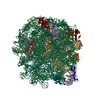
|
|---|---|
| 1 |
|
- Components
Components
+50S ribosomal protein ... , 25 types, 25 molecules ABCDEFGJKLMNOPQRSUVWXYZaI
-RNA chain , 2 types, 2 molecules 12
| #26: RNA chain | Mass: 946680.625 Da / Num. of mol.: 1 / Source method: isolated from a natural source / Source: (natural)  |
|---|---|
| #27: RNA chain | Mass: 36957.961 Da / Num. of mol.: 1 / Source method: isolated from a natural source / Source: (natural)  |
-Protein / Non-polymers , 2 types, 2 molecules H

| #29: Chemical | ChemComp-U7Y / |
|---|---|
| #8: Protein | Mass: 12063.077 Da / Num. of mol.: 1 / Source method: isolated from a natural source / Source: (natural)  |
-Details
| Has ligand of interest | Y |
|---|---|
| Has protein modification | Y |
-Experimental details
-Experiment
| Experiment | Method: ELECTRON MICROSCOPY |
|---|---|
| EM experiment | Aggregation state: PARTICLE / 3D reconstruction method: single particle reconstruction |
- Sample preparation
Sample preparation
| Component | Name: 50S ribosomal subunit / Type: RIBOSOME / Entity ID: #1-#28 / Source: NATURAL |
|---|---|
| Molecular weight | Experimental value: NO |
| Source (natural) | Organism:  |
| Buffer solution | pH: 7.4 |
| Specimen | Conc.: 0.3 mg/ml / Embedding applied: NO / Shadowing applied: NO / Staining applied: NO / Vitrification applied: YES |
| Vitrification | Cryogen name: ETHANE |
- Electron microscopy imaging
Electron microscopy imaging
| Experimental equipment | 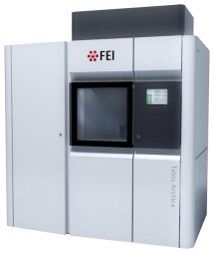 Model: Talos Arctica / Image courtesy: FEI Company |
|---|---|
| Microscopy | Model: FEI TALOS ARCTICA |
| Electron gun | Electron source:  FIELD EMISSION GUN / Accelerating voltage: 200 kV / Illumination mode: FLOOD BEAM FIELD EMISSION GUN / Accelerating voltage: 200 kV / Illumination mode: FLOOD BEAM |
| Electron lens | Mode: BRIGHT FIELD |
| Image recording | Electron dose: 47 e/Å2 / Detector mode: COUNTING / Film or detector model: FEI FALCON III (4k x 4k) |
- Processing
Processing
| CTF correction | Type: PHASE FLIPPING AND AMPLITUDE CORRECTION |
|---|---|
| Symmetry | Point symmetry: C1 (asymmetric) |
| 3D reconstruction | Resolution: 3.1 Å / Resolution method: FSC 0.143 CUT-OFF / Num. of particles: 77500 / Symmetry type: POINT |
 Movie
Movie Controller
Controller









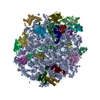
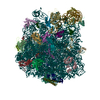

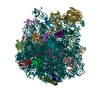
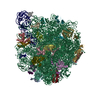
 PDBj
PDBj